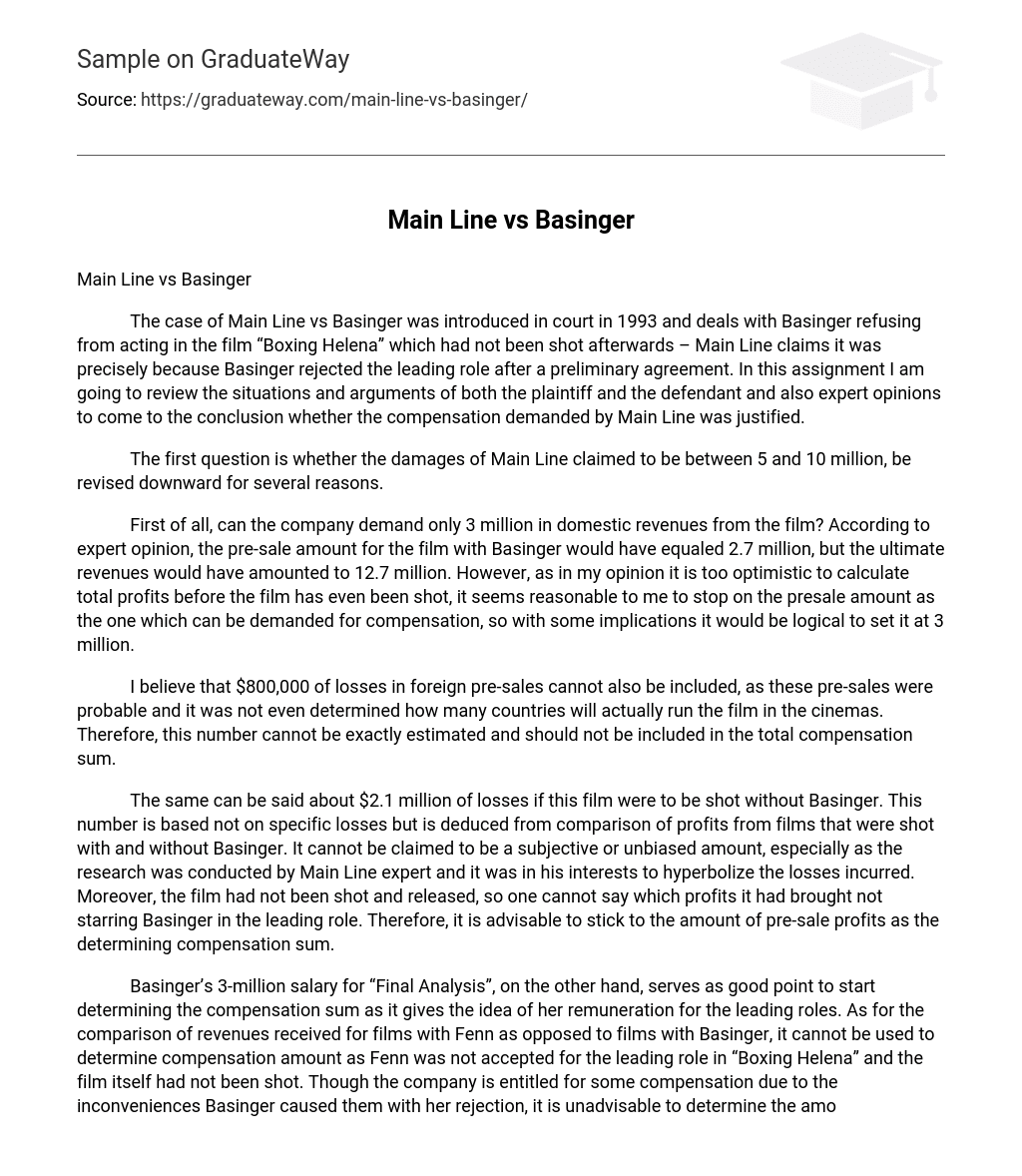The case of Main Line vs Basinger was introduced in court in 1993 and deals with Basinger refusing from acting in the film “Boxing Helena” which had not been shot afterwards – Main Line claims it was precisely because Basinger rejected the leading role after a preliminary agreement. In this assignment I am going to review the situations and arguments of both the plaintiff and the defendant and also expert opinions to come to the conclusion whether the compensation demanded by Main Line was justified.
The first question is whether the damages of Main Line claimed to be between 5 and 10 million, be revised downward for several reasons.
First of all, can the company demand only 3 million in domestic revenues from the film? According to expert opinion, the pre-sale amount for the film with Basinger would have equaled 2.7 million, but the ultimate revenues would have amounted to 12.7 million. However, as in my opinion it is too optimistic to calculate total profits before the film has even been shot, it seems reasonable to me to stop on the presale amount as the one which can be demanded for compensation, so with some implications it would be logical to set it at 3 million.
I believe that $800,000 of losses in foreign pre-sales cannot also be included, as these pre-sales were probable and it was not even determined how many countries will actually run the film in the cinemas. Therefore, this number cannot be exactly estimated and should not be included in the total compensation sum.
The same can be said about $2.1 million of losses if this film were to be shot without Basinger. This number is based not on specific losses but is deduced from comparison of profits from films that were shot with and without Basinger. It cannot be claimed to be a subjective or unbiased amount, especially as the research was conducted by Main Line expert and it was in his interests to hyperbolize the losses incurred. Moreover, the film had not been shot and released, so one cannot say which profits it had brought not starring Basinger in the leading role. Therefore, it is advisable to stick to the amount of pre-sale profits as the determining compensation sum.
Basinger’s 3-million salary for “Final Analysis”, on the other hand, serves as good point to start determining the compensation sum as it gives the idea of her remuneration for the leading roles. As for the comparison of revenues received for films with Fenn as opposed to films with Basinger, it cannot be used to determine compensation amount as Fenn was not accepted for the leading role in “Boxing Helena” and the film itself had not been shot. Though the company is entitled for some compensation due to the inconveniences Basinger caused them with her rejection, it is unadvisable to determine the amounts as if the film had been shot and run on cinema screens.
Therefore, as I have already stipulated, the amount of compensation should be based on domestic presales, which amount to 2.7 million.
Yet another question has to be considered: if the Basinger had remained with the film, and three million would have been deduced from her remuneration as compensation, whether all this money would go to Main Line or be paid to other people? In my opinion, all of the damages should be paid to Main Line as it is the sole party to the contract the breach of which had been effectuated. However, I do not agree with the decision of jury to award 7.1 million worth of compensation. Based on the reasoning that I have provided above, I believe that the compensation to Main Line should amount to 4.2 million dollars – comprising of 2.7 million worth of film domestic presales and the sum of 1.5 million awarded by the jury in reality for bad faith to contract. I believe that the latter sum is justified as bad faith to contract indeed took place as it was proven that except for oral arrangement there had been in fact a written contract. Therefore, the general conclusion that I have drawn about the case is that Basinger should be held liable but for smaller sum as a significant portion of it is based on suppositions and roughly estimated and highly biased numbers, which cannot serve as a basis for court decision. In fact, the compensation should be based on the liability directly caused by Basinger and not on possible implications which may have arisen in case the film had been shot before court proceedings. It is confirmed yet again by the fact that when the film was finally shot (after court decision) the actual profit numbers did not correspond to estimated ones.
Works Cited
Financial Accounting Standards Board. 1981. Financial Reporting by Producers and Distributors of Motion Picture Films. SFAS No. 53. Stamford, CT.
Klady, L. 1995. “Kombat” Martials Forces. Daily Variety (August 21): 1/12.
Main Line Pictures, Inc., A Delaware Corporation, Plaintiff, vs. Kim Basinger, An Individual; Mighty Wind Productions, Inc., A California Corporation; International Creative Management, Inc., A Delaware Corporation; and Does 1 To 20, Inclusive, Defendants; Superior Court of the State of California For the County of Los Angeles, No. BC 031180. 1993.
Silver Screen Partners III, L.P. 1986. Prospectus. New York: Saver Screen Partners III, L.P.





